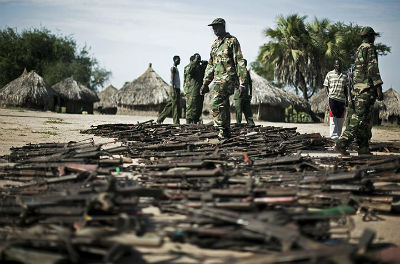 John Chol Deng Yol
John Chol Deng Yol
August 19, 2013 (SSNA) — First and foremost, I need to shed light on how weapons spread into the hand of civilians in South Sudan particularly in Jonglei State. The civil war in Sudan lasted approximately two decades and resulted in high militarization and arms proliferation among civilians. These arms are an unceasing danger to communities as there have not been major comprehensive disarmament initiatives.
The arms problem was further exacerbated by the influx of arms from rebel groups to the communities; these rebel groups include but not limited to that of late General George Athor Deng and David Yau of Eastern Jonglei. The question that hangs in the mind is whether the arms are astutely used or being misused by the civilians in Jonglei State. Apparently, there could be need or no need for civilians to be armed.
Some civilians acquired firearms unlawfully for personal protections where adequate civilian protection services were discovered limited; however, the weaponries are being misused by civilians in cases of child abduction, cattle raiding, murder, inter-communal violence, road block thievery… etc.
Arms proliferation has contributed to insecurity in Jonglei State, including cattle raiding and armed robberies. It is very difficult to say how many weapons are in Jonglei State because the weapons are everywhere in the state including Bor town, the state capital. What is being speculated is that there is a proliferation and illicit trade in small arms across Jonglei State.
The situation is also exacerbated by lack of laws controlling the sale of small arms and light weapons across South Sudan. This and other factors have direly contributed to the proliferation of arms across South Sudan particularly in Jonglei State.
Coupled with many tribal influences, weapons proliferation remains a central cause of increasing conflict here in Jonglei State. The presence of copious armed civilians increased the fatality rates of communal homicide, cattle raid and undermined the effectiveness of security sector reform within the state.
Now that we know who has small arms and light weapons in Jonglei State, what can be done? This question possesses different answers from various actors, though; we should not sit behind and consent to the power of weapons proliferation to rule us forever.
It is high time that we the citizens of Jonglei State have to wake-up to face our contemporary challenges with strong determination to relinquish on some of our uncouth behaviors. But let’s look closely on some sanctions as would be the case. Jonglei crises need solutions from within otherwise our turmoil will not stop until we the affected state citizens stand firm and say enough is enough to our obsolete variances. There has to be a new culture of peace and reconciliation, tolerance and respect for diversity as our unity of purpose would mean our fortes.
As a collective endeavor, the central Government has to be supported in the provision of peace in Jonglei State. It is our shared onus as citizens and civil societies in this part of the country to undertake public awareness campaigns on the danger of illegal arms possession, support peace-building campaigns for the realization of community development projects.
Nevertheless, the national legislative assembly needs to enact up-to-date laws regulating weapon circulation in the hands of civilians. We need laws that allow the state government to acquire marking machines and undertake gun registration with local population prior to simultaneous civilian disarmament.
The law should also allow state government, particularly the case of Jonglei state, to perform “cattle branding” where applicable to differentiate various communities’ animals. It will help in the process of distinguishing and identifying cattle raided from other communities.
Since it’s equally contingent to disarmament and demobilization of former combatants, the central government has to accelerate demobilization and reintegration of ex-combatants in South Sudan to limit arms circulation amongst the civilians.
John Chol Deng Yol is a concerned citizen of Jonglei State residing & working in Bor Town. The author is reachable thru [email protected].

